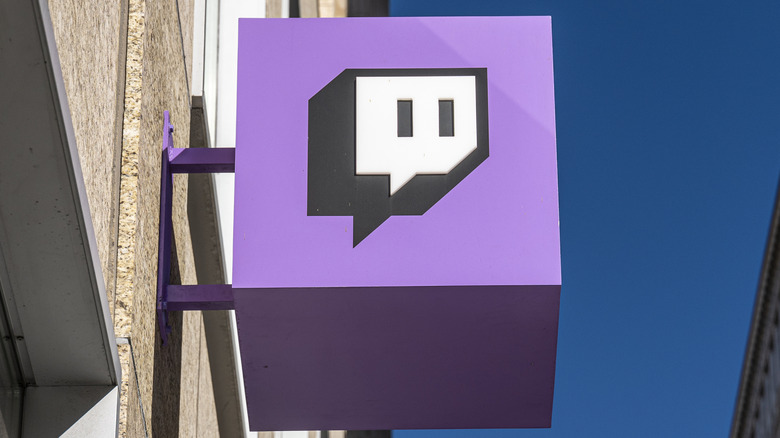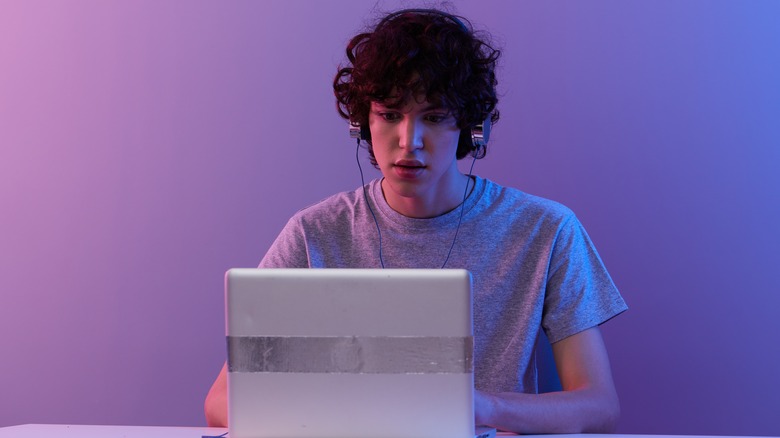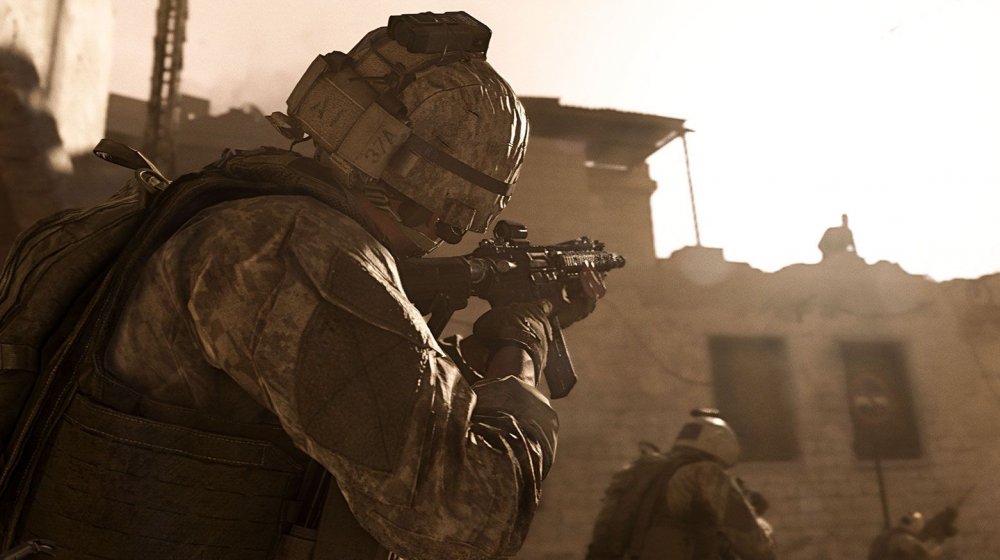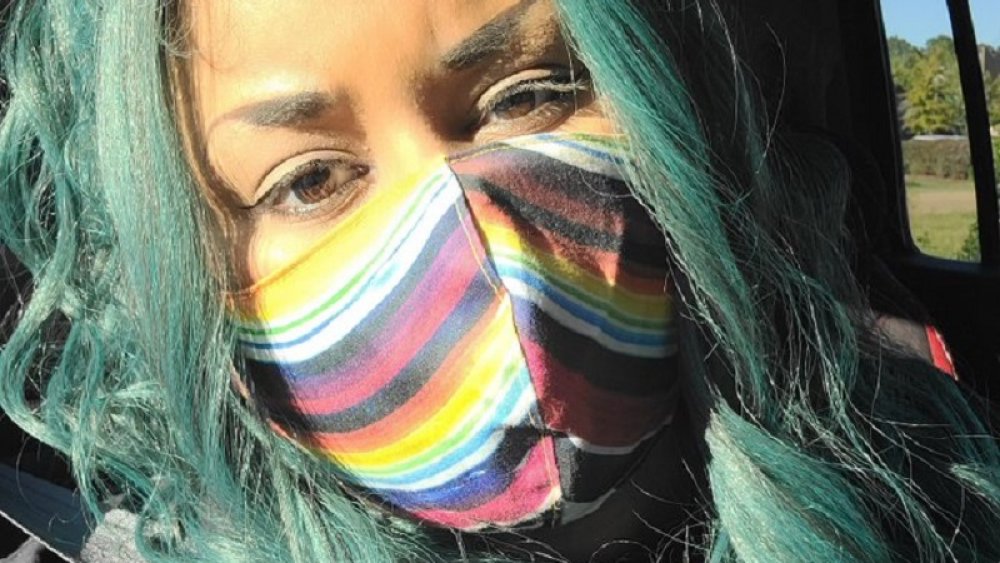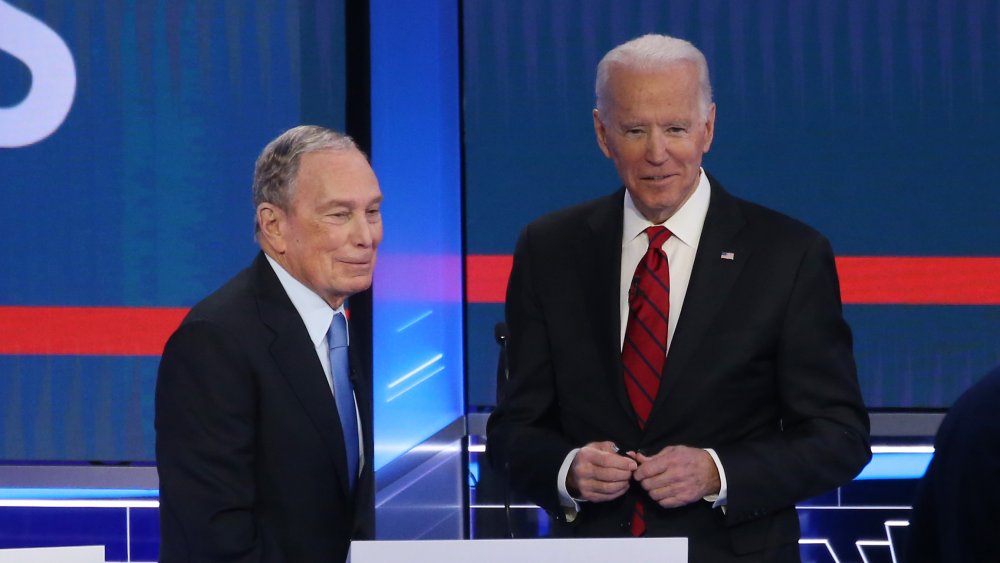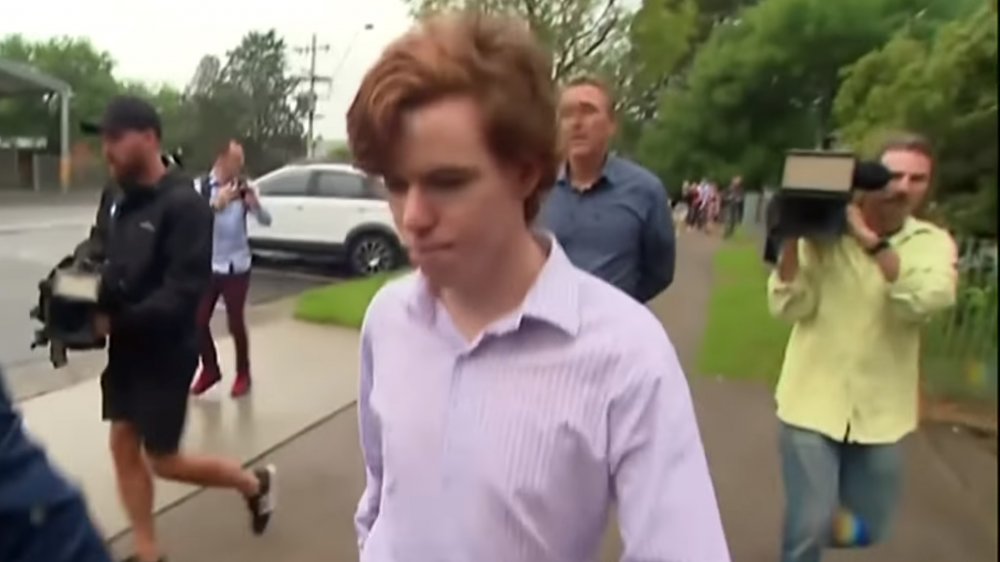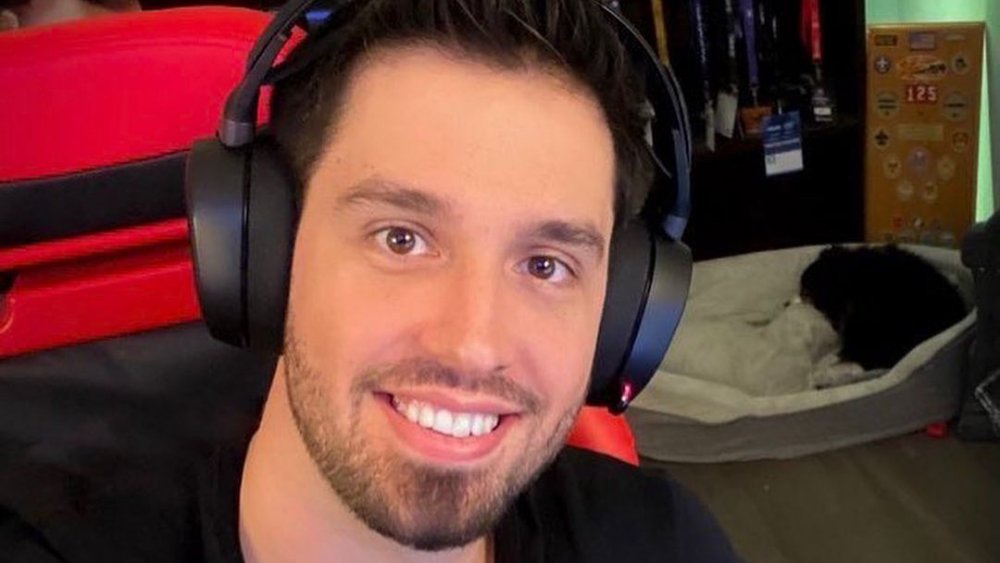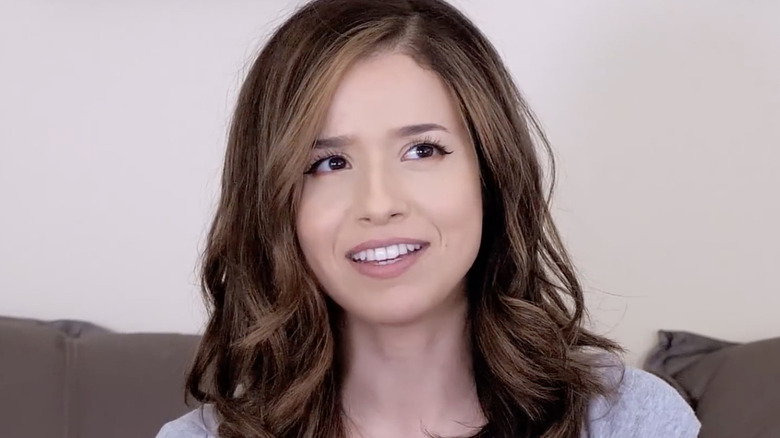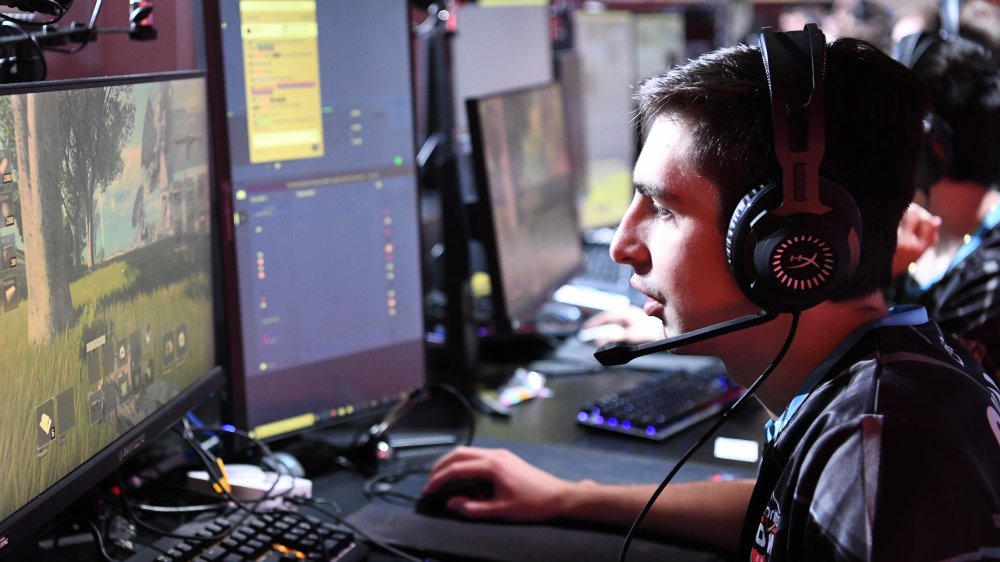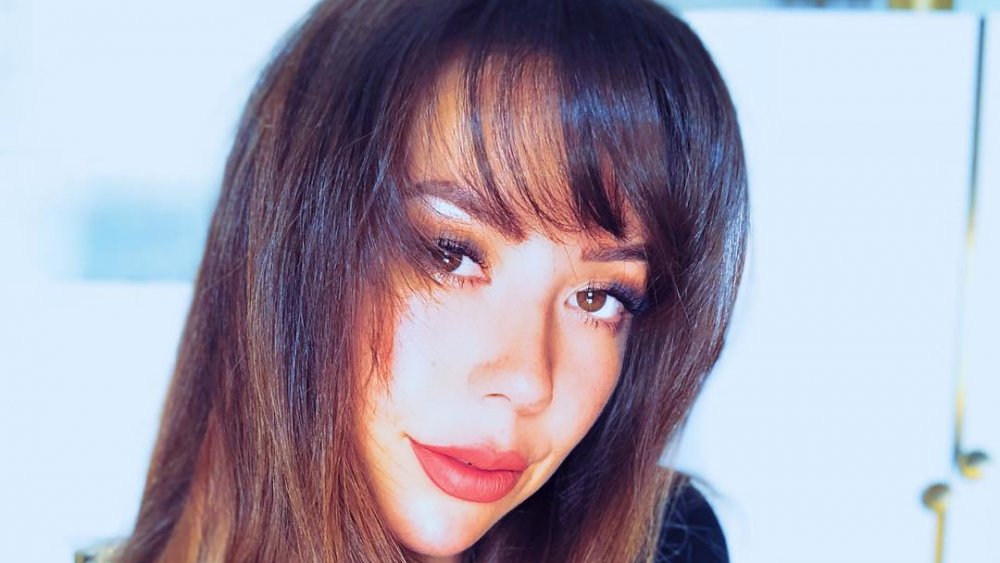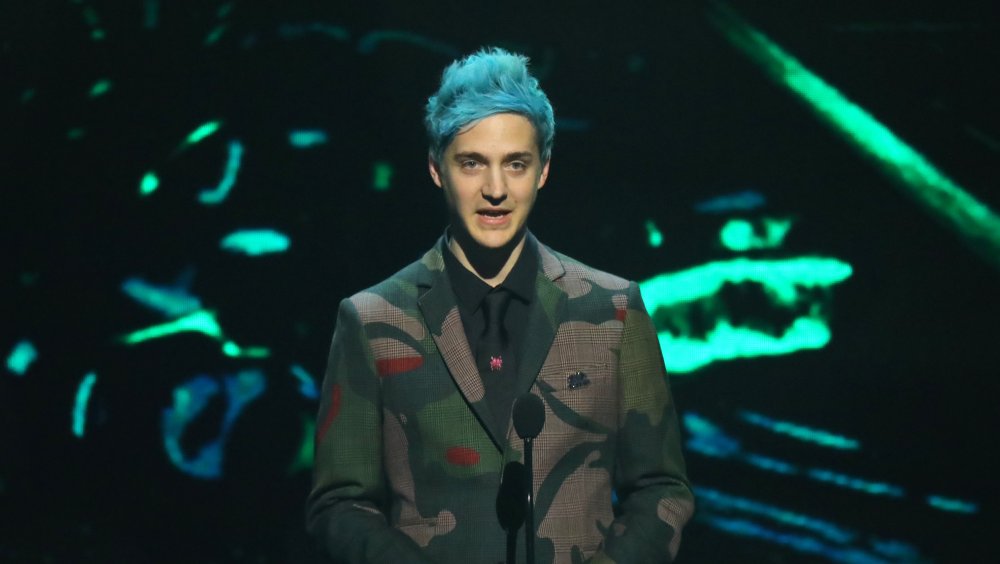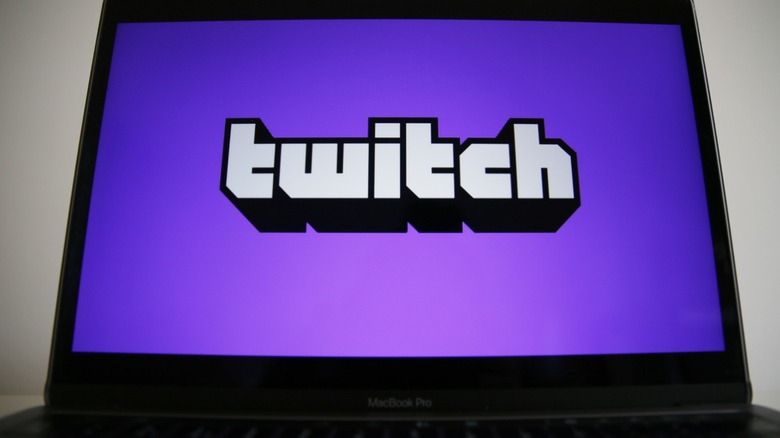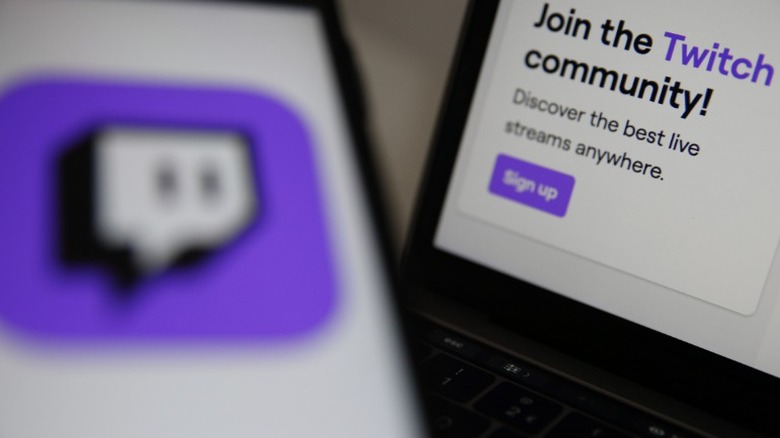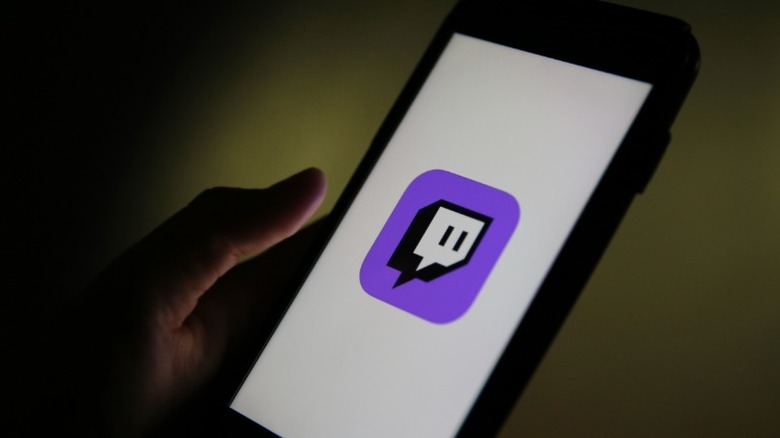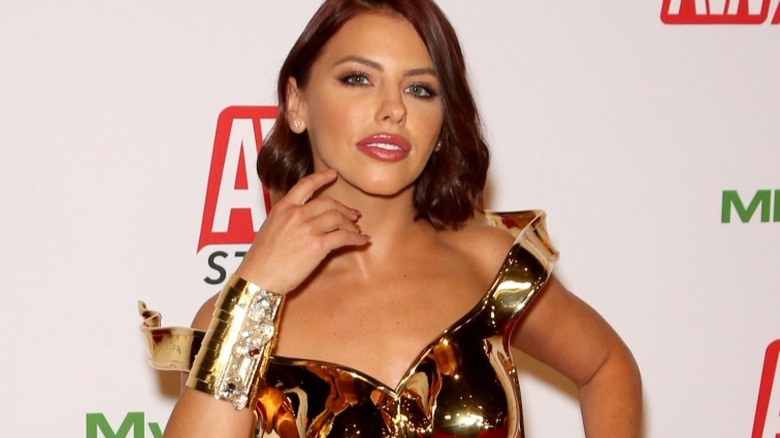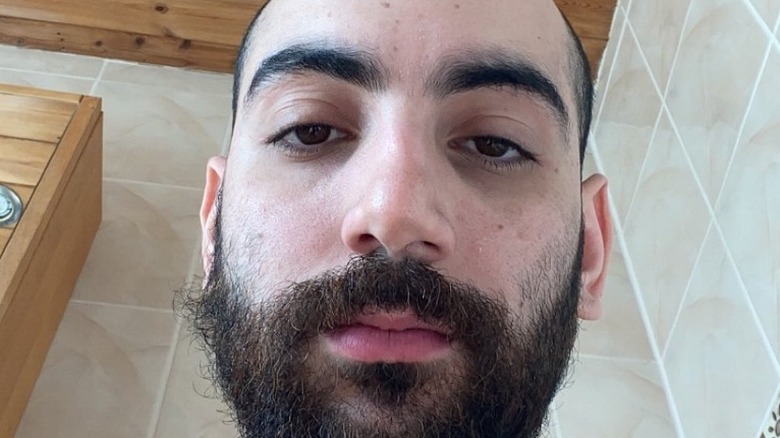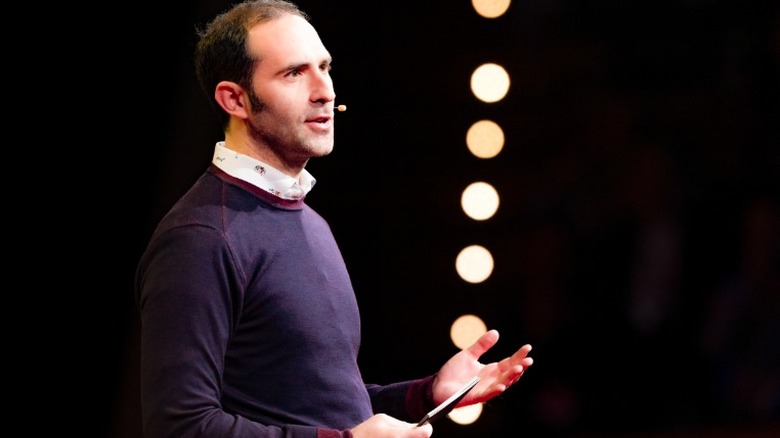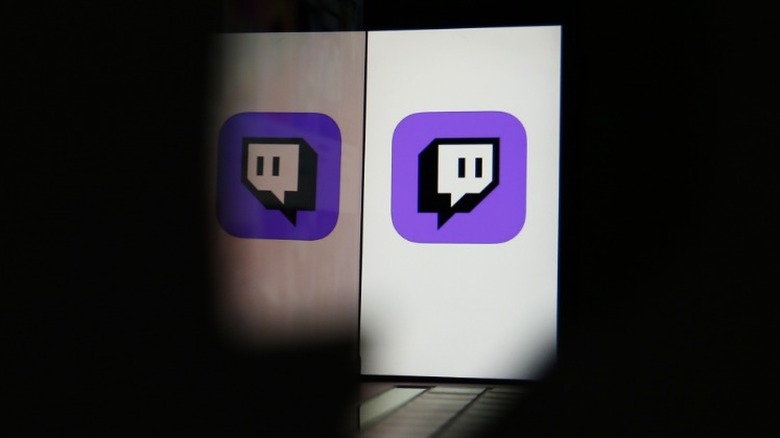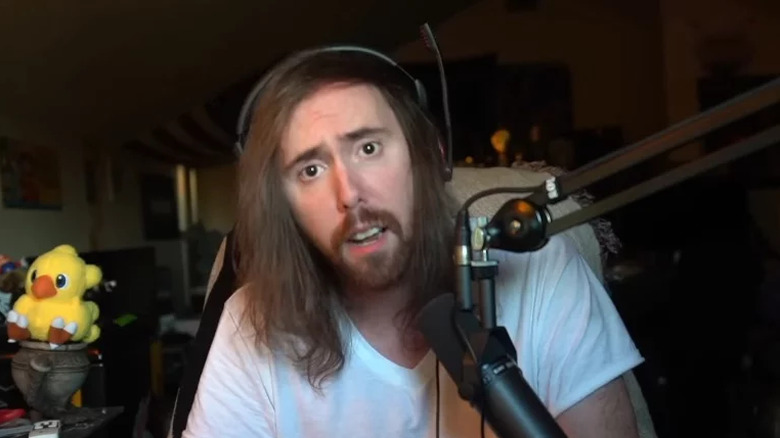The Shady Side Of Twitch
Over the last decade, Twitch has reshaped the landscape of competitive and social gaming. The platform introduced a new way for gamers to experience their favorite games and created some of the first real video game celebrities in the form of major streamers. For as dominant as the service is today, it rose from humble beginnings. In 2007, Justin Tan launched a live casting site called Justin.tv that mixed reality TV and live streaming. While viewers weren't immediately sold on the reality portion, the idea of livestreaming video captured a lot of attention.
In 2011, Justin.tv created a video gaming-specific channel called Twitch, which quickly became its most popular aspect. By 2014, the entire company had rebranded as Twitch. But despite its millions of fans, Twitch hasn't been free of controversy. While Twitch has done a lot to curtail negative aspects of the community, there have still been a few missteps. Here is the shady side of Twitch.
No support system for new streamers
At its core, Twitch depends on user-generated content to supply the massive demand expected by his millions of viewers. While plenty of viewers enjoy just tuning in to see some of the platform's biggest stars at play, a great deal of niche content is created by smaller streamers for a dedicated audience. Besides, one of the platform's appeals is its low barriers to entry. Anyone can start streaming and building their audience... in theory.
In reality, however, newer streamers often have a difficult time gaining momentum going on the platform. Some streamers have spent years streaming to no one, and few official tools can help raise a new streamer's visibility in any significant way. The Twitch community has attempted to build its own methods of helping one another promote their streams, such as "follow4follow" groups, and even streams dedicated to users essentially begging for followers.
Yesterday I stumbled upon Twitch's dark underbelly, and I was horrified by what I saw...
by
u/Supple_Meme in
Twitch
These barriers have helped raise the profile of some of Twitch's biggest competitors, such as Kick, YouTube, and Facebook Gaming. While these sites have a smaller user base than Twitch, that often means that new streamers have a better chance of standing out from the crowd and building an audience.
The US Army used Twitch as a recruiting platform
Twitch has reached a point where it is not only changing the landscape of the gaming community but also has begun to cross over into mainstream culture. When a medium becomes a good way to reach a new audience it attracts attention from sources its creators may not expect. This became controversial when recruiters from the US Army, Navy, and Air Force began using the platform to reach children as young as 13, the minimum age requirement for a Twitch account.
The US military using video games isn't new. The "America's" Army series launched in 2002 as a free game to recruit people for the Army. However, the military's approach to Twitch was subversive. In one instance, it asked asked viewers to register for information on joining the military in order to win an unspecified prize.
The military paused this practice after free speech advocates criticized the military's ability to ban viewers who made comments that cast the Army in a negative light. According to a report from the New York Times, lawyers from the Electronic Frontier Foundation argued that allowing government representatives to perform these bans was a violation of free speech and the First Amendment.
Twitch chat is notoriously terrible
Twitch's chat function is essential to the overall experience. On the side of almost every stream is a continually updating messaging portal that allows viewers to address both the streamer they are watching and their fellow viewers. The chat often consists of memes and other inside jokes that are specific to the stream, making it a major force in building a real streaming community.
Like so many things on the internet, however, the consequence-free nature of anonymous usernames means the chat can often become toxic, to say the least. Viewers are relentless if a professional player makes a mistake and just as cruel when watching casual streamers play. Things can even descend into both racial and sexual harassment at times, depending on who is being targeted.
Both Twitch and the gaming community at large have been accused of doing too little to combat this problem. While Twitch does have clear anti-harassment policies, enforcement of them against the vast number of malicious Twitch Chat users has largely proven ineffective.
Twitch fails to respond seriously to harassment
The nature of Twitch's user-generated content and dynamic community building has pushed the question of who is responsible for policing negative behavior on Twitch streams. Many users and streamers have argued Twitch itself should be working harder to eliminate harassers as the governing body of the service. However, given the influence that streamers and event organizers have over their communities, Twitch has sometimes tried to place more of that responsibility in the hands of whoever is running the stream.
Trying to eliminate every negative voice while running an entertaining stream is a difficult job. One streamer, Zombaekillz, described her struggle in an article for Tom's Hardware: She planned to run a scheduled stream of "Minecraft Dungeons" with her daughter, to be featured on Twitch's front page — an exciting opportunity for anyone on the platform. However, during the stream, she had to ban 54 users for sexist and racist comments.
Zombaekillz is far from alone. Female streamers have reported that their most significant obstacle to success on Twitch is harassment. While Twitch told NBC in 2019 it had doubled the staff dedicated to dealing with harassment, the issue remains.
Twitch bans streamers who showed a political debate (over a fake strike)
In the United States' charged political environment, any action taken towards political speech on either side is likely to draw attention. That's what happened to Twitch when it banned multiple political streamers for rebroadcasting and commenting on a Democratic debate in 2020.
About an hour into a high profile debate between the Democratic nominees for president, Twitch began banning streamers showing the debate. This included Chapo Trap House, speedrunner Trihex and political analyst David Pakman. The streams shut down when Twitch received a DMCA copyright notice from Praxis Political Legal, apparently representing CBS. Shortly after that notice arrived, however, the website for Praxis Political Legal disappeared. The organization, Twitch relayed to Vice, was fake. CBS had served no copyright claims against Twitch or the streamers, who were quickly reinstated.
This wasn't the first time that Twitch had responded to users streaming a debate, however. In 2019, at an earlier Democratic debate leading up to the 2020 election, Time Warner handed over a very real DMCA notice to Twitch. Twitch halted the casts of several prominent political streamers, and each received a suspension.
Violence caught on streams
Horrifying real-world violence has found its way onto Twitch live streams before, and has been met with universal denouncement by Twitch and the viewing public.
A minor "Fortnit"e streamer who went by MrDeadMoth, real name Luke Munday, was heard being physically and verbally abusive to his wife and family off-camera while streaming. Munday was charged with assault in Australia and banned from the Twitch. Munday briefly returned to Twitch about a month after the incident, only to receive another ban after an outcry from gamers worldwide.
A prominent "Call of Duty" streamer and member of the SoaR Gaming brand Carl Riemer fired a loaded gun by accident while streaming. A shocked Riemer destroyed his expensive monitor and frightened his pets out of the room before realizing what had happened. He was promptly banned from Twitch and removed from the SoaR roster.
Violent criminals have also tried to use the platform to glorify their unspeakable actions. A shooting at a synagogue in Germany, for example, was streamed live on Twitch.
One-sided contracts with streamers
Twitch's most prominent stars deserve a lot of credit for the platform's explosion and its crossover success with mainstream viewers. The strategists behind Twitch known this, as do their biggest competitors, YouTube Gaming and Facebook Gaming. To keep these streamers on their service, each will try to sign streamers to lucrative exclusivity deals. But some of the deals Twitch has made with streamers, especially during the platform's earlier years, have been deemed unfair by courts.
Take the case of banned "Counter-Strike: Global Offensive" streamer James Varga, who went by the name PhantomL0rd. Banned for streaming CS:GO gambling sites, Varga pushed back by suing Twitch for lost income. When he did so, however, he found that a contract he signed kept him from pursuing more than $50,000. A judge later ruled the contract was both unfair and unconscionable. The retired esports player celebrated his victory by taking a photo outside of Twitch headquarters, giving the building the bird.
Streamers and the DMCA
One of the most significant issues both Twitch and streamers face is dealing with copyrighted material. Since 2014, Twitch has worked with Audible Magic to identify archives of Twitch streams and mute them if they contain unlicensed music. The decision was unpopular from the get-go, and its sudden implementation was followed by an apology from Twitch CEO Emmett Shear during a Reddit AMA. He went on to say that giving the community no notice was a mistake and to promise that live streams would never be subject to audio recognition.
While these reassurances may have temporarily calmed the community, problems with DMCA takedowns persist to this day. In June 2020, another round of DMCA takedowns started after Twitch was served with mass takedown requests for clips with music released between 2017 and 2019. The situation hit a new low in October when Twitch began deleting clips without giving streamers any warning or recourse to challenge the DMCA notifications that supposedly targeted them. Partnered streamers received emails about the deletions, along with vague warnings that they needed to delete content that violated the DMCA to avoid further repercussions.
The sudden deletions and threatening emails were only the beginning. As Twitch did not provide a method for identifying which videos were causing problems, several high profile streamers like Pokimane and Lirik braced themselves to delete the majority of their VODS — effectively erasing years of content and hard work. While Twitch eventually admitted that it had panicked and botched the whole affair, for many streamers the damage had already been done. The company promised creators better communication and support for detecting DMCA violations in a Nov. 11 blog post. The same day, Twitch encouraged streamers to turn off or mute in-game audio while streaming titles to avoid complications, which went over about as well as you would expect on a platform built around the concept of livestreaming video games.
Twitch ads can be too intrusive
Free online services depend on advertising revenue to exist and Twitch is no exception. While there is a broad spectrum of what in platform advertising is acceptable and what isn't, Twitch has found itself on the wrong end of conversation all too often.
One of the focal points of Twitch advertisement is a discussion about where the ad revenue actually goes. Only the top level of Twitch streamers, Partners, make money off of ad revenue. For the rest of the community, Affiliates and regular Streamers, any revenue generated by advertisements goes to Twitch.
Amazon customers and other viewers were upset when Twitch Prime subscriptions removed the ability to enjoy ad-free content. Midroll ads were a brief experiment the service tried as well. However, viewers and streamers came together to vote against midroll ads becoming a fixture, as the ads sometimes blocked pivotal moments in streams. However, these were far from being the only controversies surrounding ads.
Twitch fights sexual harassment
A reality of Twitch is the pervasive nature of sexual harassment towards female streamers, viewers, and even employees of the company. These negative aspects of the platform are a sad reminder of inappropriate and unfair treatment that women often face in the gaming community.
In 2020, a tidal wave of sexual harassment allegations against prominent streamers on the platform occurred. As a result, Twitch made an official announcement that it had updated policies regarding sexual harassment and began banning streamers who had violated these policies. Later in the year, Twitch's accounts director of strategic partnerships, Hassan Bokhari, was terminated after being accused of sexual misconduct by a streamer named Vio. The streamer described the resolution as "bittersweet," considering the mountain of evidence she had to present to Twitch to get them to act on her information.
Vio isn't the only streamer who has been unhappy with the way Twitch has responded to severe instances of sexual harassment. Samantha Wong, who streams as Sampai, presented allegations of misconduct to Twitch's CEO, the head of Twitch HR, and the VP who managed the accused streamer's relationship with Twitch. It took more than a year for the company to respond.
Inappropriate material promoted on Ninja's old channel
Ninja is one of the best-known streamers on Twitch and one of the few to achieve crossover mainstream success. For example, he appeared as a surprise guest on FOX's The Masked Singer to both the hosts' and the audience's excitement.
When Ninja left Twitch to pursue a contract with Mixer in 2019, Twitch had some tough choices to make about what to do with the community of 14 million subscribers he left behind. Instead of removing Ninja's channel, Twitch decided to leave it up. Subscribers could still see archives of Ninja's streams, while Twitch used it to promote other channels on their platform.
However, all of this went incredibly wrong when Ninja's dormant channel began promoting a stream that featured pornography. Incensed, Ninja published a video on Twitter explaining the situation to his fans and, perhaps more importantly, his fans' parents. After all, Ninja had spent years building a brand of family-friendly content while streaming "Fortnite," and many viewers felt betrayed by the inappropriate content.
Disgusted and so sorry. pic.twitter.com/gnUY5Kp52E
— Ninja (@Ninja) August 11, 2019
Twitch CEO Emmet Shear apologized on Twitter, both to Ninja and the community. This might have helped patch things up between Twitch and Ninja, as the streamer eventually returned to Twitch in September 2020.
2022's big info leak
Managing online security is one of the biggest challenges for any modern company. Companies like Twitch need to be cognizant of how they protect their data because leaving it undefended can hurt huge amounts of people. With millions of users, some of whom make their living streaming, Twitch had a big responsibility when it came to data.
In October 2021, the company confirmed via Twitter that someone had breached its servers. At the time, the company may have believed that the breach wasn't going to be all that serious, but when the data leaked out online, it quickly became clear that Twitch had been severely compromised.
The leak that followed the breach spilled plenty of company secrets. We learned that Amazon had planned to create a Steam alternative that never ended up seeing the light of day, and Twitch's entire source code suddenly became available to everyone online. The worst news for streamers was that the leak included Twitch's payout information going all the way back to 2019, revealing that roughly half of all the money earned on Twitch went to the top 10% of streamers. It also highlighted the extreme lack of diversity among the highest-earning streamers online.
Ending 70/30 splits
In September 2022, Twitch made one of the most controversial decisions in the company's history. Then-President Dan Clancy wrote a blog post breaking down the company's decision to change how it handles revenue splits with streamers. According to the post, Twitch had unfairly been offering some top streamers a 70/30 split on subscriptions, rather than the typical 50/50 split, and it didn't have any standard criteria for who would get the better deal.
Twitch's solution? End 70/30 splits for everyone. The post announced that anyone with a 70/30 deal could keep that split on the first $100,000 in revenue they generated, but afterwards the split would be reduced to 50/50. Going forward, the plan was that no one would be offered a 70/30 deal. In the post, Clancy cited server costs as one of the main motivators for Twitch to keep 50% of streamers' subscription revenue, and offered a slightly better split on ad revenue to help streamers make up their lost profits.
Streamers and fans alike were outraged. Many felt that 70/30 splits should be standard, especially since other platforms like Facebook and YouTube offer that deal to everyone. The ad revenue compromise pleased virtually no one; viewers hate watching ads, so streamers hate running them. Very few were buying the claim that Twitch needs to make up for server costs, because Twitch's servers are owned by Amazon.
In June 2023, Twitch rolled out a new way for Partners to get 70% of their subscription revenue for their first $100,000 in earnings. Any Twitch Partner who keeps 350 or more paid subscribers for three months can enroll in the Partner Plus program. The new 70/30 split only lasts for 12 months, and it's still a far cry from what streamers and their fans actually want, but the program is a sign that Twitch might be taking its users' concerns somewhat seriously.
Twitch's child predator problem
In 2022, Bloomberg published an exclusive report on one of the most disturbing problems facing Twitch: a rash of child predators using Twitch to groom children. Twitch doesn't allow anyone under the age of 13 to make an account on the platform, but the barrier to entry is relatively low, so plenty of children have been making accounts and streaming from their phones. The report found nearly 2,000 different Twitch accounts that primarily followed accounts from children who were young teens or otherwise under the official Twitch age limit.
Finding accounts that watched kids would have been bad enough, but Bloomberg also encountered many instances of these accounts interacting with the children they were watching. Some would ask them to do suggestive dances, and others would attempt to get the kids to move to a more private platform like Snapchat or Discord to keep talking. The report also pointed out that while child predators are a problem everywhere online, they seem to have an outsized presence on Twitch.
After the report, Twitch made an announcement introducing some changes aimed at addressing these concerns. The company beefed up age verification processes in an attempt to reduce the number of kids under 13 using the platform, as well as blocked certain search terms that are frequently used by predatory accounts. Twitch also partnered with outside organizations for assistance and acquired Spirit AI to enhance its ability to monitor chat conversations. Those are all welcome changes, but the problem is far from solved.
TwitchCon injuries
TwitchCon is supposed to be the most entertaining event in the entire streaming industry. It's a place where streamers and fans can come together to network in person and create content. Like streamers themselves, TwitchCon is a boisterous event that's more about having fun than creating a typical business convention environment.
2022's TwitchCon made a strong case that the event as a whole needs to be run a little more tightly. As part of the goofy atmosphere, the convention featured a massive foam pit where attendees could go to battle, likely getting some good clips for their channels in the process. It should have been a good way for people to let out some energy, but it turned into an unmitigated disaster.
Adrianna Chechik was tragically injured in the foam pit, which turned out to be just inches deep and set on top of a concrete slab. When Chechik fell into the pit, she broke her back in two places and needed to have extensive surgery, followed by plenty of physical therapy, just to be able to walk again. She was the most severely injured person at the convention, but she was far from the only attendee who took a nasty tumble in the foam pit.
Gambling controversy
Twitch hit a breaking point with gambling streams in 2022. For years, the platform had allowed people to stream themselves playing just about any gambling game they wanted. Because of this, some streamers who played slots, roulette, and poker had huge amounts of viewers turn up to watch them win or (perhaps more frequently) lose money.
It's no secret that gambling can be addictive, and that addiction can make people do some awful things. In September 2022, Twitch streamer Sliker admitted that he'd scammed thousands of dollars out of viewers to support his own gambling habit. People had already been speaking out against the prevalence of gambling on Twitch, but after this incident, streamers started making their own stances on gambling crystal clear.
Fans joined in the effort and began petitioning Twitch to completely remove gambling from the platform, arguing that it was harming viewers, particularly young ones, and roping more people into addictive behavior. The company eventually responded, updating its Community Guidelines to ban streaming of any "sites that include slots, roulette, or dice games and aren't licensed either in the U.S. or in other jurisdictions that provide sufficient consumer protection."
Of course, that still leaves some wiggle room for gambling to exist on Twitch. Streamers and fans had been arguing that any form of gambling is damaging to the platform, so in all the ways that matter, Twitch still has a gambling problem.
Major executives leaving
The upper echelons of any business serve two main functions: They make large scale decisions for the company, and they also provide a sense of stability to all the people who regularly engage with that company. With some of its top executives fleeing the company, Twitch has not looking nearly as stable as it once did for many users.
In March 2022, Bloomberg reported on the stunning number of employees that Twitch had lost. The company cut 300 employees in 2021, and another 60 decided to leave in the first three months of 2022. Among those who packed their bags were Twitch's chief operating officer, chief content officer, and head of content development. The trend of top-level executives getting away from Twitch didn't slow down as the year progressed, either. In September 2022, as the company was embroiled in a controversy surrounding its revenue splits, Constance Knight, Senior Vice President of Global Creators, also decided to call it a day.
2023 might have been the year that Twitch turned things around, but the company instead got its biggest shakeup yet. On March 16, CEO Emmett Shear, who co-founded Justin.tv (which later became Twitch), announced on Twitter that he was resigning from his position. Shear wrote that his confidence in Twitch had never been higher, but the rest of the community might not have been so sure.
In October 2006 we started working on live video for the internet. That became Twitch. More than 16 years later, I'm now a father and ready to move to my next phase of life. I wrote a blog post, but the short version is: thank you so much to everyone who built this with me.
— Emmett Shear (@eshear) March 16, 2023
Layoffs
In recent years, Twitch has made a number of unpopular decisions with the stated goal of increasing the platform's profitability. Ending 70/30 splits was one deeply controversial way that the company tried to boost its revenue. That move might have inspired some of Twitch's top executives to look for new work, and it certainly caused some streamers to start eyeballing the competition. What's even more upsetting for Twitch is that these recent decisions apparently haven't worked all that well.
New Twitch CEO Dan Clancy released a blog post on March 20, 2023, which brought some disappointing news about the company. Clancy revealed that Twitch was going to be laying a huge part of its workforce. He said that 400 employees would be let go, but the reasons behind the layoffs were vague. "Our business has been impacted by the current macroeconomic environment," Clancy wrote, "and user and revenue growth has not kept pace with our expectations."
Bloomberg reported that the layoffs primarily affected Twitch's moderation team and a recently formed AI ethics team. Considering the desperate need Twitch has for more moderation, those cutbacks are deeply concerning. And as AI becomes a more prevalent tool of online platforms, maintaining a dedicated ethics team seems like a reasonable ask. For now, Twitch will be going with less of each — and streamers and fans will have to judge what happens next for themselves.
Branded content debacle
It's inevitable that a company as large as Twitch is going to upset people from time to time as various problems arise. Sometimes issues on Twitch brew for months or years before they finally spark outrage, but Twitch faced the fallout of its new ad policy the moment the company announced its latest move.
On June 6, 2023, Twitch unveiled a slew of changes to how advertising works on its platform. The new policies put restrictions on logos — limiting them to 3% or less of total screen space — and banned burned-in ads outright. Streamers generate the vast majority of their income through ads and sponsorships, so they were immediately up in arms about the decision, which limited these avenues. Plenty of streamers called out the move as a blatant cash-grab from Twitch, and big names like Asmongold even called for a boycott of the platform. Luckily for the company, the new policy also addressed the potential for streamers fleeing Twitch — by adding a $25 charge for any Twitch Partners trying to leave.
I don't say it lightly but I think this is a legitimate situation where streamers should consider boycotting Twitch or moving to other platforms
Making common and harmless forms of advertisement literally against ToS so Twitch can monopolize more of streamers income https://t.co/LgofvJKnWo
— Zack (@Asmongold) June 6, 2023
Largely thanks to the extreme outcry from streamers and fans, the new branded content policy didn't stay in place for long. Twitch quickly reversed course and announced via Twitter that it would be completely reworking the new guidelines. A rewrite was certainly welcome, but Twitch showed its hand with the new policy, and rebuilding trust between the company and its streamers is going to be an uphill battle. In the weeks that followed, major streamers like Amouranth and xQc left Twitch to join rival streaming platform Kick.
Twitch quietly killed simulcasting
While the entire streaming community was railing against Twitch for trying to cut into the ad revenue of its streamers, the company quietly made another pivotal change to its Terms of Service. Simulcasting is an important capability for streamers who aren't locked into a platform-specific contract. It lets them share their stream on multiple platforms at the same time, meeting their audience wherever they may be at. Simulcasting doesn't just help streamers grow their audience, it also helps connect viewers on different platforms and encourages them to potentially take a look at a site they may not regularly visit.
That's no longer an option for anyone who wants to stream on Twitch. When Twitch updated its policies on June 6, 2023, it also killed simulcasting for all its users, restricting them to only sharing their Twitch streams in short formats on sites like TikTok and Instagram. Previously that rule had only applied to Twitch Partners and Affiliates.
Streamers were quick to share their opinions. Ninja said that Twitch's latest move "only hurts their platform and the creators on their site." While reacting to Ninja's take on the issue, xQc explained to his channel that, in his view, Twitch is trying to lock in streamers and viewers alike by restricting them to a single platform. xQc said he thinks this strategy is bound to fail.
"They force you to choose and [Twitch users] will dwindle down slowly until it completely flips. And when that flips it's impossible to go back," xQc argued. This likely contributed to xQc's decision to jump ship shortly thereafter.

